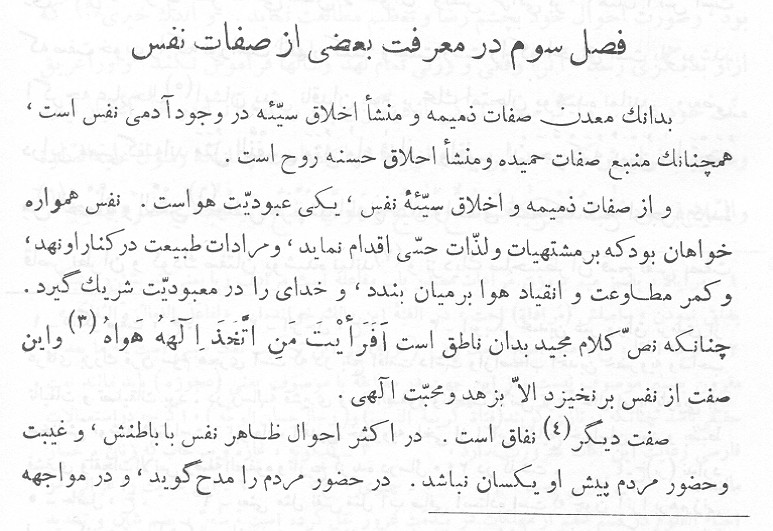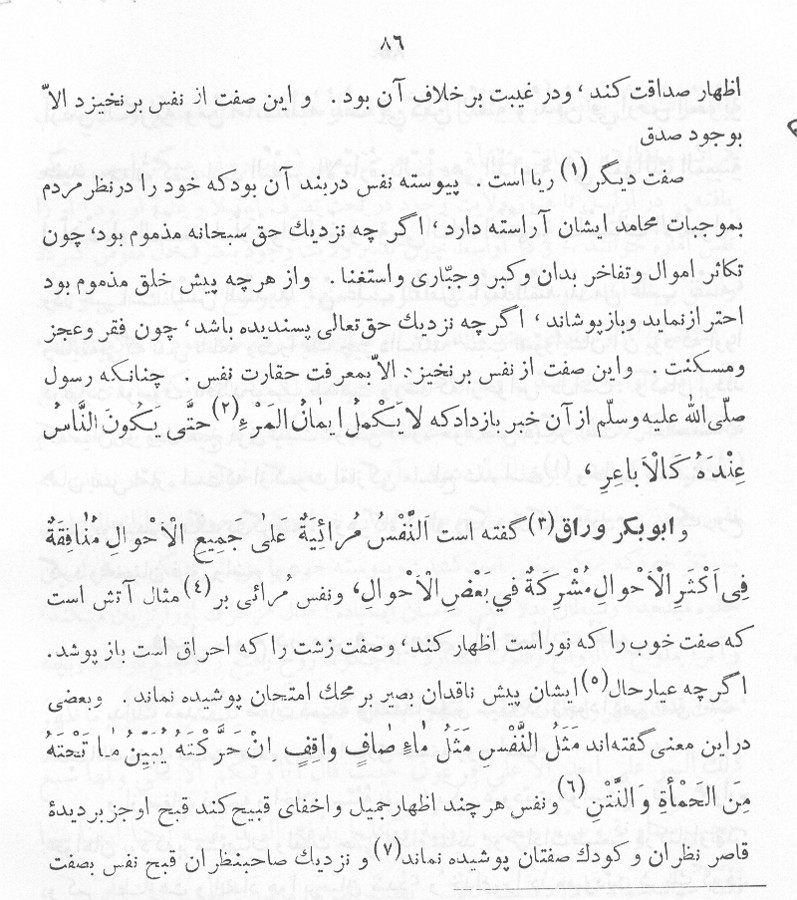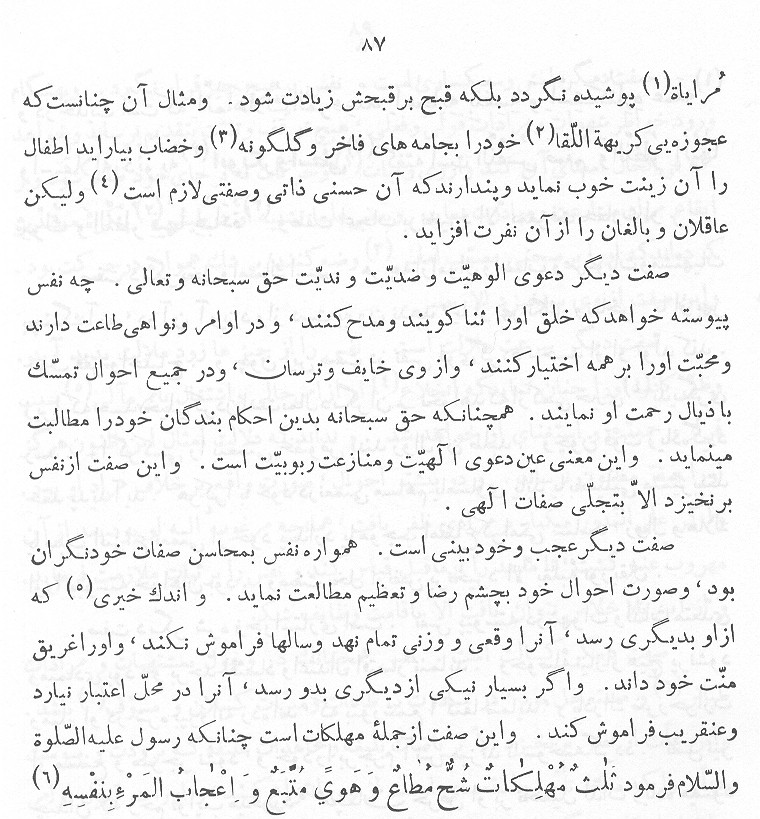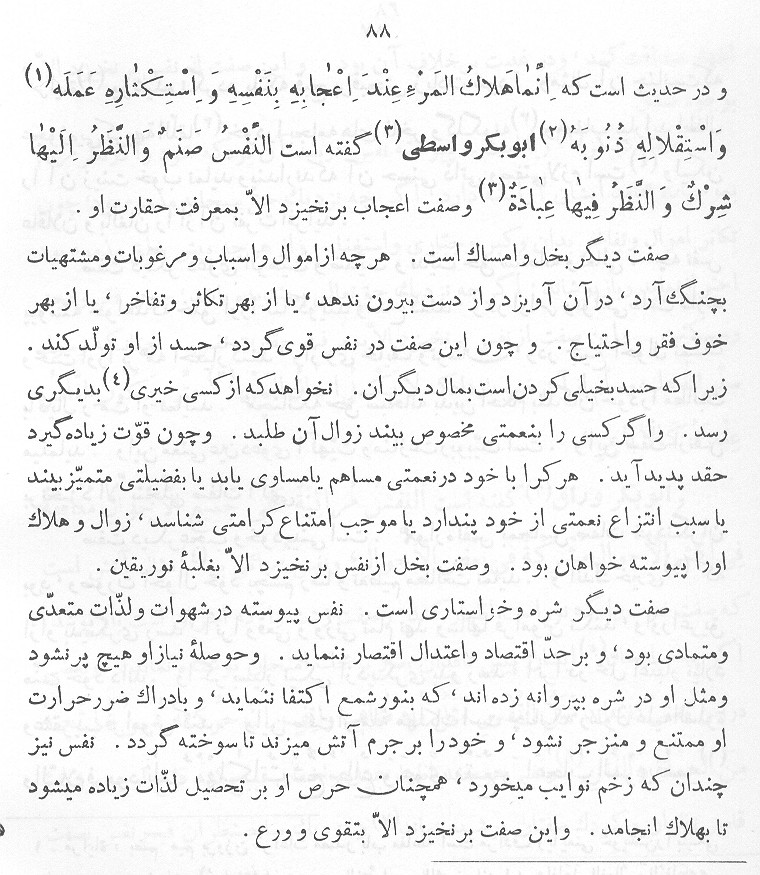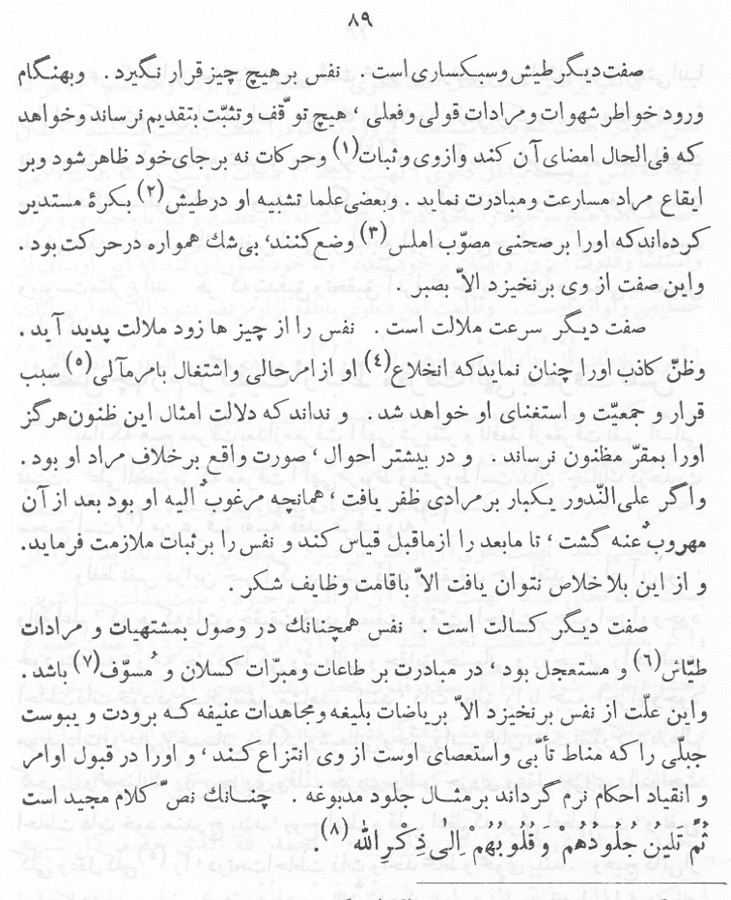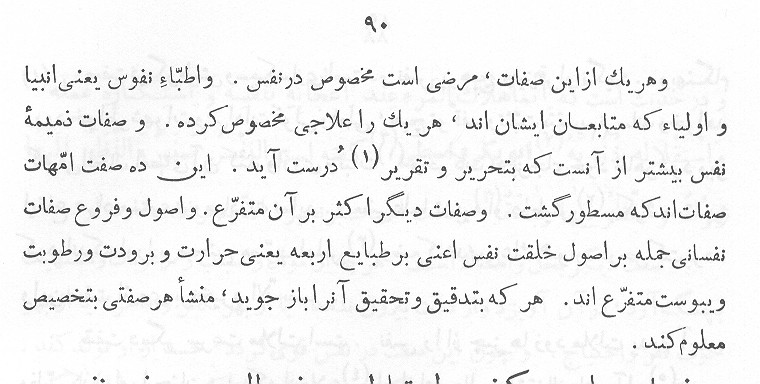
The Lantern of
Guidance
Chapter 3
Section 3
Ma’refat (Gnosis) of Some
Attributes of the Nafs (Psyche)
Discussion
Join
Know that the source for all
blameworthy characteristics and the root for all foul behavior within
the human being is the Nafs (Psyche),
in contrast the source for all
praiseworthy characteristics and the root for all fine behavior is the
Rooh (Soul).
Perhaps the top worst
blameworthy characteristic and foulest behavior, is the desires’
Aboodiyat (Servitude). Nafs perpetually strives to indulge the pleasure
of the senses, providing them with what intrinsically they crave for,
committing to obey the desires in most agreeable fashion, therefore
sharing the exclusive serfdom & obeisance to the Lord with the
desires. Thus spoke the Nass (Lection) of the glorious words, “Then
seest thou such a one as takes as his god his own vain desire?”
(Koran
[45:23]) and this characteristic of the human being arises from the
Nafs (Psyche)
unless there is Zohd (Asceticism)
or Mahab-bat (Divine
Love).
Another characteristic is
hypocrisy. In most situations the exterior of the Nafs and its
interior, in absence or in presence of the people are not the same. In
presence of the people Nafs (Psyche) praises them with such seemingly
true friendship and in their absence Nafs (Psyche) does the opposite.
And this characteristic arises from the Nafs (Psyche) unless there is
truth & veracity within the person.
Another characteristic is Ria
(Menpleasing, Showing off). Nafs (Psyche) constantly adorns itself in
the eyes of the people with what pleases them, even though those maybe
shameful with the Lord e.g. accumulating wealth, boasting about wealth,
arrogance, pomp and aggression. Moreover Nafs (Psyche) avoids all that
which are blameworthy with the people, even though they may be praised
by the Lord e.g. Faqr (Poverty), humility and meekness. And this
characteristic arises from the Nafs (Psyche) unless there is Ma’refat
(Gnosis) of the lowliness of the Nafs. For that reason the Messenger of
Allah peace be upon him said, “There is no Kamaal (Perfection) for the
man’s Iman (Faith) until people are like camels to him”. (This means
when the man does a good deed the eyes of the people are like the eyes
of the animals to him i.e. he has no benefit from impressing them like
there is no benefit or pleasure in impressing a camel)
Abu-Bakr Warraq said, “Nafs
(Psyche) wallows in Ria (Menpleasing, Showing off) in all situations, a
hypocrite in most situations and a Moshrik (Polytheist) in some
situations”. Menpleasing Nafs (Psyche) is like fire, shows off the good
attribute i.e. the light and hides the evil attribute i.e. the heat.
However the karat of Nafs’s (Psyche’s) purity is not concealed from the
analytic eyes of the wise who can measure by the scale of trials as
have been said, “The similitude of the Nafs (Psyche) is like still
clear water as soon as you wave it, reveals the bottom dirty
sediments”. As much as Nafs (Psyche) attempts to show off beauty while
hiding the ugliness, its ugliness is hidden only for the short sighted
folk and the immature that can be fooled by surface characteristics.
Those with sound vision not only see the ugliness of the Nafs (Psyche)
they also see more ugliness when it attempts to beautify itself. Like
the example of an old ugly woman who may wear beautiful colorful cloths
that may fool some children about her lack of beauty but the adults
know better and are repulsed by her attempts to deceive.
Another characteristic is
claim to Uluhiya (Divinity) i.e. competing & opposing the Lord.
Since
Nafs (Psyche) perpetually desires & demands from the people to
praise & admire it, to obediently conform to its wants &
prohibitions meanwhile ceaselessly loving it. Nafs (Psyche) demands to
be feared and all people to grasp at its mercy. These are similar to
how the Lord demands that Its slaves to seek It and due to these
characteristics there is a conflict between the Nafs (Psyche) and the
Lord. And this characteristic arises from the Nafs (Psyche) unless
there is Tajalli (Manifestation) of the Divine Sifat
(Attributes).
(This is when the dervish what of the power, greatness and glory finds
around him attributes them to the Lord not to some created object and
what of
mercy, blessing and beauty he finds attributes them to the Lord again.
Because from the power & glory to mercy & beauty these are the
extracts derived from the Divine
Attributes (Sifat))
Another characteristic is
wondering with self-admiration. Constantly the Nafs (Psyche) beholds
with admiration its own goodness and reads itself with the eyes of
greatness and satisfaction. And if a tiny bit of goodness emanates from
him to someone, shall place a heavy weight upon the person and drowns
him within his benevolence for years to come. On the contrary if huge
sums of goodness comes to him from another, he does not give much
credit and soon forgets the favor. And this characteristic is one of
the major sources of death for man as was said by the Messenger of
Allah peace be upon him, “There are three deaths: miserliness, obeying
the desires and wondering with admiration for the Nafs (Psyche)”. Again
in another Hadith (Prophetic Narration), “Indeed befalls destruction
upon the man that wonders & admires his Nafs (Psyche) and magnifies
his good deeds and down plays his wrong doings”. Abu-Bakr Waseti said,
“The Nafs (Psyche) is an idol, glancing upon it is Shirk (Polytheism),
musing it is Ibaada (Worship)”. And this characteristic arises from the
Nafs (Psyche) unless there is the Ma’refat (Gnosis) of Nafs’s
(Psyche’s) lowliness.
Another characteristic is
miserliness. Whatsoever of wealth, belongings, goodness and pleasures
he clasps at so hard and would never let go of, either due to hoarding
& boasting or fear of poverty and need. And once this attributes
grows strong within the Nafs (Psyche), it begets Hasad (Envy). Hasad
(Envy) is to be miserly for what belongs to others. He wishes no good
to be exchanged between two people. And if he sees a person with a
blessing wishes deterioration & loss for that blessing. And again
if this becomes too powerful within the Nafs (Psyche) hate & spite
appears i.e. if he sees someone equal to him in some blessing or
someone that is distinguished in some blessing, constantly wishes the
destruction of the blessing and the death of the person. And this
characteristic arises from the Nafs (Psyche) unless there is the
subjugation by the luminosity of the Yaqin (Doubtless Certainty for the
Divine). (These feelings appear through the Nafs (Psyche) because the
man has doubts within with regards to Allah Almighty. So if you are
envious of someone or feel too attached to your belongings, it means
you are doubting Allah.)
Another characteristic is the
covetousness & gluttony. Nafs (Psyche) is constantly seeking the
indulgence & pleasure of the prolonged desires, therefore cannot
economize, balance or truncate the effects of these indulgences. The
example of the gluttony of the Nafs (Psyche) is that of a moth flying
around a candle, the light of the candle does not satiate him thus even
in presence of the knowledge of fire’s harm the moth dives into the
flame and burns to death. Much the same manner, in spite of the
injuries inflicted upon the Nafs (Psyche) still the greed overpowers it
until such time death catches up. And this characteristic arises from
the Nafs (Psyche) unless there are righteousness & piety.
Another characteristic is
being frivolous and thoughtless. Nafs (Psyche) is constant upon
nothing. As soon as some whiff of desires or desirable talk or action
may enter it, without any restraint approves of that thought or desire
and rushes upon such endeavor. Some scholars likened the Nafs (Psyche)
to a ball on an inclined surface, doubtless & perpetually in
motion. And this characteristic arises from the Nafs (Psyche) unless
there is patience.
Another characteristic is
speeding towards the melancholy & sorrow. Nafs (Psyche) fills with
sorrow fast, facing every disagreeable situation. And his false
suspicions & worries cause him to forsake the current situation and
run towards another with the hope of better gain. However unbeknownst
to him there is no haven for him to seek refuge within from his false
suspicions & worries. Since in most affairs the reality is against
what he desires. And this characteristic arises from the Nafs (Psyche)
unless there is the dutiful establishment of the Shokr (Gratitude).
Another characteristic is
laziness & idleness. As Nafs (Psyche) was rushing thoughtlessly
towards the indulgence of the desires, when it comes to piety &
worship it becomes lazy & procrastinating. And this characteristic
arises from the Nafs (Psyche) unless there is much Riadha (Taming the
desires through meditation) and much hard work to eject the low-energy
tendencies out of him and to soften him to accept the Divine Edict
& Commandments like the softening of the leather skin. As was said
in the Nass (Lection) of the Majestic Words, “Then their skins and
their hearts do soften to the celebration of Allah’s praises”
(Koran
[39:23]).
Each one of the above said
characteristics is an ailment exclusive to the Nafs (Psyche). And the
healers of the Nafs (Psyche) i.e. the prophets and the Awlia (Divine
Patricians) who follow them know a specific cure for each ailment.
There is a lot more shameful characters of the Nafs (Psyche) that
cannot
be fit in this treatise. The above said ten characteristics were the
fundamental ones and from each many branches may stretch out. Anyone
who would research in details a given ailment of the Nafs (Psyche) can
indeed discover its source.
End.
©
2004-2002, Dara O. Shayda
